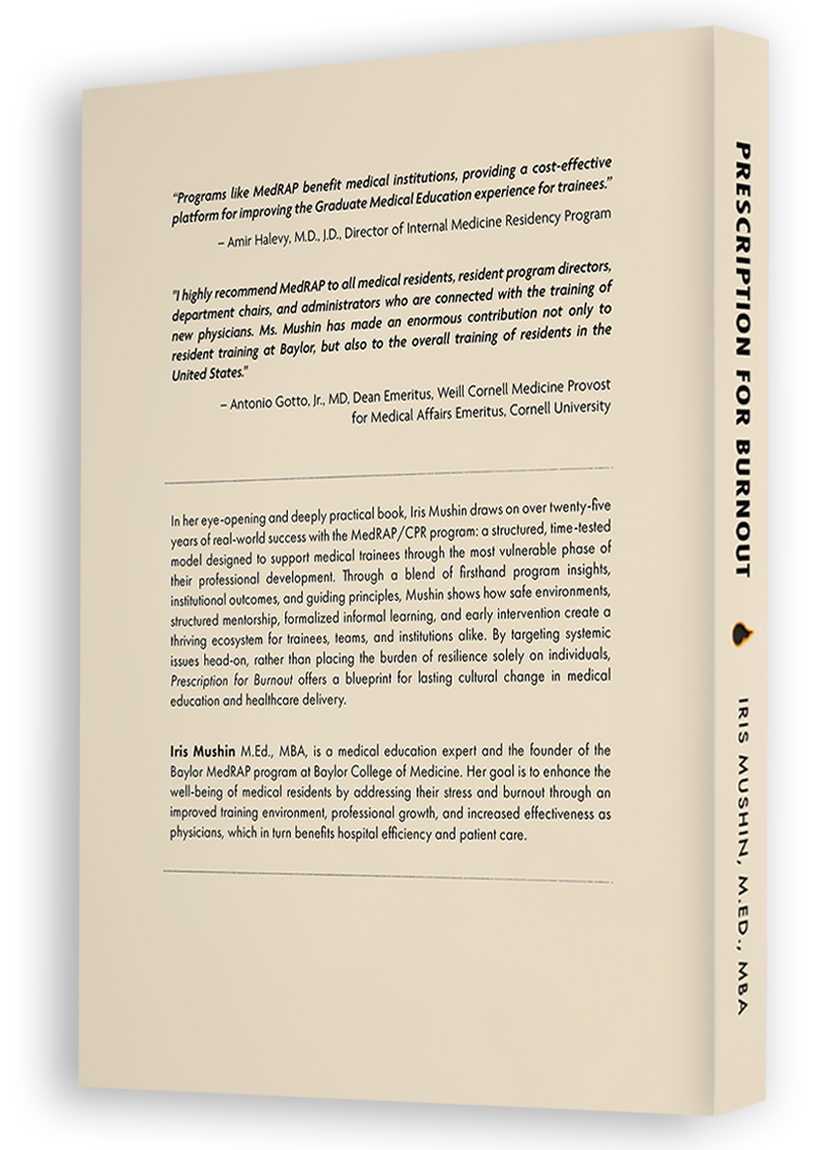Trainees can provide honest feedback without fear of retribution. The opportunity for trainees to identify problems and suggest solutions fosters teamwork and accelerates adaptation to the clinical work environment.


MedRAP, implemented for residents at Baylor College of Medicine in Houston, Texas, for over two decades, addressed multiple challenges such as: time management during medical training; preventing medical mistakes; and effective communication with patients, families, and staff. It also contributed to a positive organizational culture and helped improve hospital operations and efficiency, leading to better patient care. Following MedRAP’s success, What Hurts the Physician Hurts the Patient was published in 2018.

The program was later expanded into the Clinician Program for Resilience (CPR) to meet the needs of all healthcare trainees making similar transitions into the clinical training environment (e.g., medical students, nurses, physician assistants, nurse practitioners, and advanced practice providers) and is now referred to as MedRAP/CPR.
Changes in the medical industry and the recent pandemic have exacerbated challenges in the medical field. Clinicians face increasing levels of stress, mental health issues, and burnout, making comprehensive programs like MedRAP/CPR highly beneficial for sustaining the resilience and well-being of healthcare professionals, which is critical not only to the clinicians themselves, but also to patient outcomes and the entire healthcare system.
Core Program Principles
Senior clinicians mentor the junior clinicians, sharing insights and strategies to manage challenges they are likely to experience in clinical work, thereby strengthening their professional development.
The informal learning that typically occurs on hospital wards is transformed into a structured curriculum, ensuring that trainees are prepared with strategies to handle common challenges.
The program’s structure allows for early identification of personal or professional difficulties, providing timely support through internal or external resources.
Trainees participate in a CQI process that involves collaboration with healthcare team management to improve patient care and hospital efficiency. This process can also help reduce medical mistakes and assist with risk management.
- Accelerates the transition into the clinical training environment
- Develops organizational, communication, and leadership skills
- Develops well-being, which leads to reduced stress and burnout and positively impacts patient care
- Improves hospital efficiency and organizational culture
- Meets accreditation requirements of the American Council for Graduate Medical Education (ACGME)
Rather than only managing the symptoms, MedRAP/CPR provides tools to promote well-being and preemptively addresses problems that lead to stress and burnout.
MedRAP/CPR teaches explicit communication and leadership strategies with patients and staff.
Participants are more likely to openly discuss and seek solutions for issues they encounter during their training, such as medical mistakes and problems on the hospital wards, when evaluators are not present.
MedRAP/CPR provides structured mentorship training, which benefits both the mentor and the trainee. The mentors are prepared for future leadership roles in the healthcare industry, and the trainees benefit from strong, supportive, and consistent leadership and role modeling as a result of interacting with effective mentors.
Helps identify and support trainees facing difficulties, promoting improved function in the clinical work environment, and allows for early intervention for personal and professional challenges.
The Quality Improvement (QI) component of the program involves the entire healthcare team to facilitate collaboration and improve the efficiency of the hospital work environment and patient care.
Employing protocols to minimize medical mistakes can assist with risk management and reduction of malpractice suits.
Improving healthcare professionals’ well-being, organizational efficiency and communication skills ultimately impacts patient satisfaction.
The built-in feedback mechanisms inherent to MedRAP/CPR foster collaborative teamwork among medical trainees, faculty, and all healthcare team members.
Trainees receive information regarding best and most effective practices; collective knowledge is passed down from group leaders who serve as mentors, eliminating the phenomenon of “reinventing the wheel.”
MedRAP/CPR includes a leadership training component that positively impacts participants’ effectiveness as team leaders in the hospital work environment.
Fosters a positive work environment, potentially improving job satisfaction and leading to better recruitment and retention of healthcare professionals.


